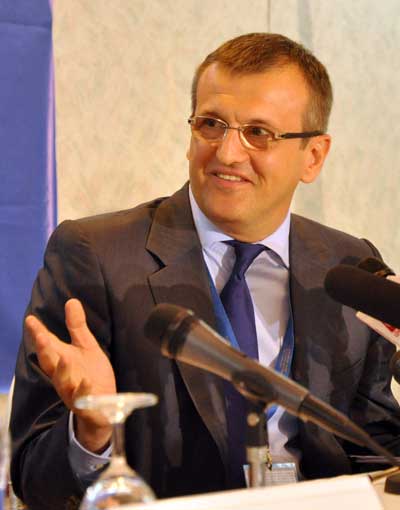Monday Feb 16, 2026
Monday Feb 16, 2026
Thursday, 20 August 2015 00:00 - - {{hitsCtrl.values.hits}}

The 17 August Parliamentary elections in Sri Lanka were “well-administered and offered voters a genuine choice from among a broad range of political alternatives, although campaign rules were restrictive,” said Cristian Preda, Chief Observer of the European Union Election Observation Mission (EU EOM) and Member of the European Parliament, dauring the presentation of the preliminary report at a press conference.
The mission stated that freedoms of assembly and movement were respected, and despite the restrictive campaign rules — not allowing candidates to engage in door-to-door campaigning, to canvass in person or distribute leaflets — party activists and candidates campaigned vigorously, focusing on small meetings with voters.
The statement also underlines that the Commissioner of Elections and his staff administered the elections in a transparent and impartial manner, demonstrated strong leadership, and enjoyed the confidence of all stakeholders. During the election period, he had exceptionally broad powers to instruct any State institution, including media and the Police.
“The wide interpretation of these powers, including that the Commissioner may order state media outlets to halt broadcasts, posed a challenge to recently gained media freedoms,” Preda pointed out.
Overall, however, journalists now enjoy a freer working environment, and State outlets could provide a platform for various political parties. Although the main ruling party benefitted from preferential treatment on state outlets, the accommodation of a plurality of viewpoints and the move towards balanced coverage are to be welcomed.
The mission considers that although there are no legal barriers for women to vote or to run as candidates, their participation was extremely low, only 9% of the candidates.
Ignazio Corrao, Head of the European Parliament delegation which joined the EU EOM on 12 July, added: “We are happy to say that elections took place in a well-organised manner and we congratulate the new elected members of the Parliament. We hope that they will conduct the important reforms the country needs and look forward to a closer cooperation with the EU.”
The European Union Election Observation Mission to Sri Lanka was established on 15 July, following an invitation from the Commissioner of Elections. The EU EOM findings are based on the information submitted by 85 observers deployed across the country. The mission will continue to observe post-electoral developments and a more comprehensive final report, with a detailed evaluation and recommendations towards improvements for the future, will be published in two months.
See also Page 16